C is an excellent, powerful, and general-purpose programming language that offers modern and generic programming features for developing large-scale applications ranging from video games, search engines, and other computer software to operating systems.
C language is usually considered the base for many other programming languages (C++, JavaScript, Java, PHP, Perl, Python, and more) due to its easy and efficient language design which includes a relatively small set of features that can be used to develop more complex systems and applications.
There are several text editors out there that programmers can use to write code, but IDE has come up to offer comprehensive facilities and components for easy and ideal programming.
What is an IDE?
An IDE (Integrated Development Environment) editor is a software application that offers an extensive collection of tools for software development, which includes a text editor, debugging tools, code compiler, version control, and other features that help software developers to write, debug, and test their code efficiently.
A text editor is generally an IDE but designed to offer a more feature-rich environment that includes syntax highlighting, code folding, auto-indentation, and code completion, which is a useful feature that helps developers to reduce code errors and write code more efficiently.
In this article, we shall look at some of the best IDEs you can find on the Linux platform that is widely used in many programming languages.
Table of Contents
1. Netbeans for C/C++ Development
Netbeans is a free, open-source, and popular cross-platform IDE for C/C++ and many other programming languages. It is fully extensible using community-developed plugins.
Netbeans includes project types and templates for C/C++ and you can build applications using static and dynamic libraries. Additionally, you can reuse existing code to create your projects and also use the drag-and-drop feature to import binary files into it to build applications from the ground.
Let us look at some of its features:
- The C/C++ editor is well integrated with the multi-session GNU GDB debugger tool.
- Support for code assistance
- C++11 support
- Create and run C/C++ tests from within
- Qt toolkit support
- Support for automatic packaging of compiled applications into .tar, .zip, and many more archive files
- Support for multiple compilers such as GNU, Clang/LLVM, Cygwin, Oracle Solaris Studio, and MinGW
- Support for remote development
- File navigation
- Source inspection

2. Code::Blocks
Code::Blocks is a free, highly extensible, and configurable, cross-platform C++ IDE built to offer users the most demanded and ideal features. It delivers a consistent user interface and feels.
And most importantly, you can extend its functionality by using plugins developed by users, some of the plugins are part of the Code::Blocks release, and many are not, written by individual users not part of the Code::Block development team.
Its features are categorized into a compiler, debugger, and interface features and these include:
- Multiple compiler support including GCC, clang, Borland C++ 5.5, digital Mars plus many more
- Very fast, no need for makefiles
- Multi-target projects
- A workspace that supports the combining of projects
- Interfaces GNU GDB
- Support for full breakpoints including code breakpoints, data breakpoints, breakpoint conditions plus many more
display local functions symbols and arguments - custom memory dump and syntax highlighting
- Customizable and extensible interface plus many more other features including those added through user-built plugins
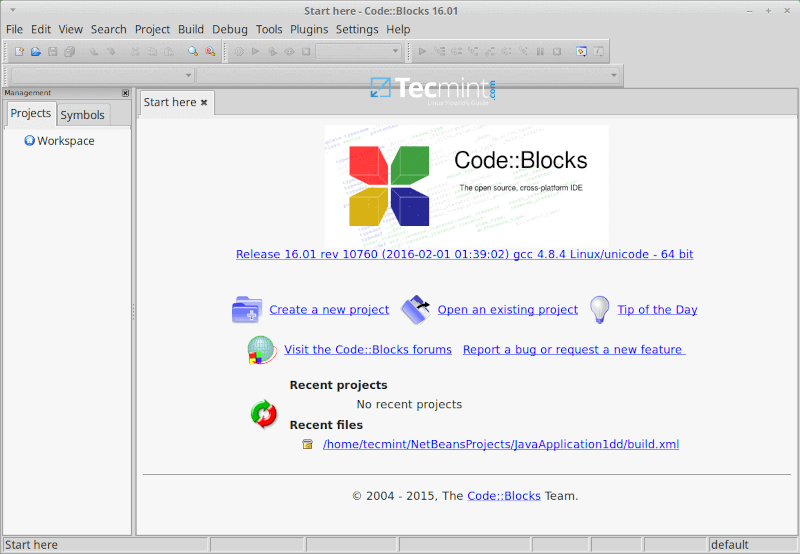
3. Eclipse CDT(C/C++ Development Tooling)
Eclipse is a well-known open-source, cross-platform IDE in the programming arena. It offers users a great GUI with support for drag and drop functionality for easy arrangement of interface elements.
The Eclipse CDT is a project based on the primary Eclipse platform and it provides a fully functional C/C++ IDE with the following features:
- Supports project creation.
- Managed build for various toolchains.
- Standard make build.
- Source navigation.
- Several knowledge tools such as call graph, type hierarchy, in-built browser, and macro definition browser.
- Code editor with support for syntax highlighting.
- Support for folding and hyperlink navigation.
- Source code refactoring plus code generation.
- Tools for visual debugging such as memory, and registers.
- Disassembly viewers and many more.
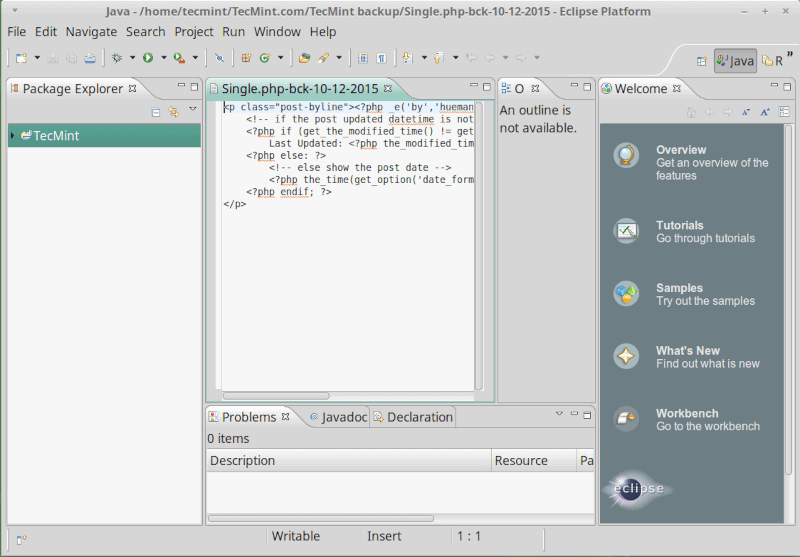
4. CodeLite IDE
CodeLite is also a free, open-source, cross-platform IDE designed and built specifically for C/C++, JavaScript (Node.js), and PHP programming.
Some of its main features include:
- Code completion offers two code completion engines.
- Supports several compilers including GCC, clang/VC++.
- Displays errors as code glossary.
- Clickable errors via the build tab.
- Support for LLDB next-generation debugger.
- GDB support.
- Support for refactoring.
- Code navigation.
- Remote development using built-in SFTP.
- Source control plugins.
- RAD (Rapid Application Development) tool for developing wxWidgets-based apps plus many more features.
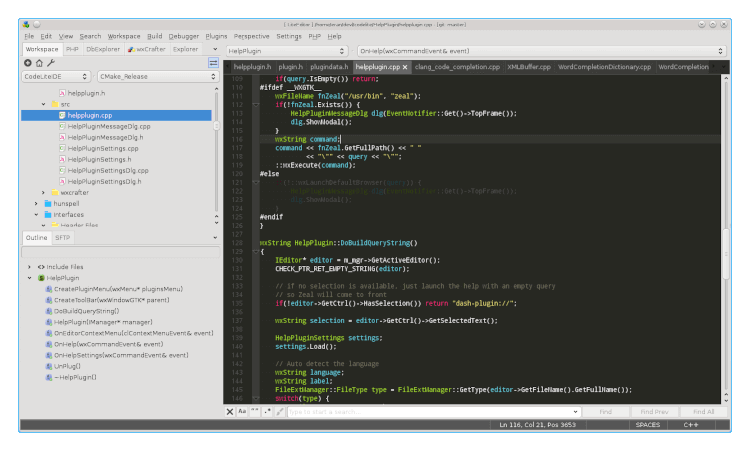
5. Bluefish Editor
Bluefish is more than just a normal editor, it is a lightweight, fast editor that offers programmers IDE-like features for developing websites, writing scripts, and software code. It is multi-platform, runs on Linux, Mac OSX, FreeBSD, OpenBSD, Solaris, and Windows, and also supports many programming languages including C/C++.
It is feature-rich including the ones listed below:
- Multiple document interfaces.
- Supports the recursive opening of files based on filename patterns or content patterns.
- Offers a very powerful search and replace functionality.
- Snippet sidebar.
- Support for integrating external filters of your own, pipe documents using commands such as awk, sed, and sort plus custom-built scripts.
- Supports full-screen editing.
- Site uploader and downloader.
- Multiple encoding support and many other features.

6. Brackets Code Editor
Brackets is a modern and open-source text editor designed specifically for web design and development. It is highly extensible through plugins, therefore C/C++ programmers can use it by installing the C/C++/Objective-C pack extension, this pack is designed to enhance C/C++ code writing and to offer IDE-like features.

7. Atom Code Editor – Deprecated
Atom is also a modern, open-source, multi-platform text editor that can run on Linux, Windows, or Mac OS X. It is also hackable down to its base, therefore users can customize it to meet their code-writing demands.
It is fully featured and some of its main features include:
- Built-in package manager.
- Smart auto-completion.
- In-built file browser.
- Find and replace functionality and many more.
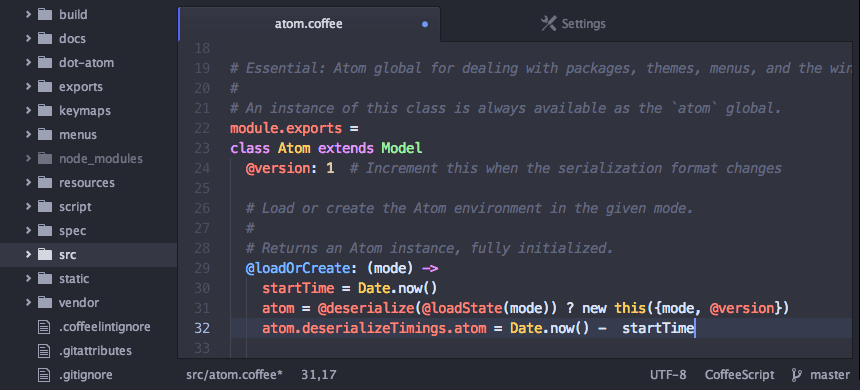
8. Sublime Text Editor
Sublime Text is a well-defined, multi-platform text editor designed and developed for code, markup, and prose. You can use it for writing C/C++ code and offers a great user interface.
Its features list comprises of:
- Multiple selections
- Command palette
- Goto anything functionality
- Distraction-free mode
- Split Editing
- Instant project switching support
- Highly customizable
- Plugin API support based on Python plus other small features

9. JetBrains CLion
CLion is a non-free, powerful, and cross-platform IDE for C/C++ programming. It is a fully integrated C/C++ development environment for programmers, providing Cmake as a project model, an embedded terminal window, and a keyboard-oriented approach to code writing.
It also offers a smart and modern code editor plus many more exciting features to enable an ideal code-writing environment and these features include:
- Supports several languages other than C/C++
- Easy navigation to symbol declarations or context usage
- Code generation and refactoring
- Editor customization
- On-the-fly code analysis
- An integrated code debugger
- Supports Git, Subversion, Mercurial, CVS, Perforce(via plugin), and TFS
- Seamlessly integrates with Google test frameworks
- Support for Vim text editor via Vim-emulation plugin
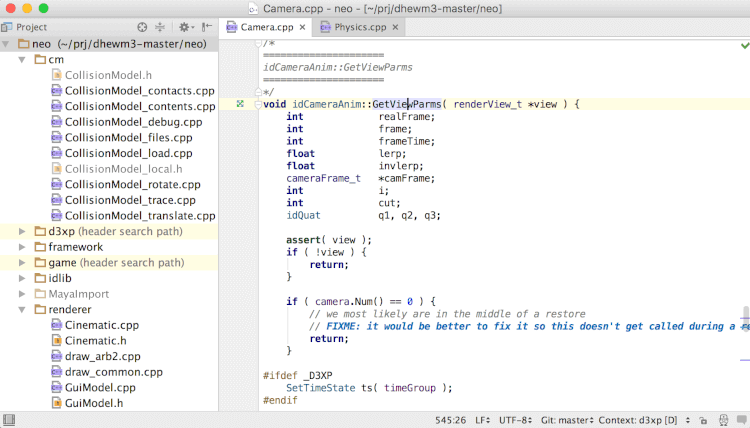
10. Microsoft’s Visual Studio Code Editor
Visual Studio is a rich, fully integrated, cross-platform development environment that runs on Linux, Windows, and Mac OS X. It was recently made open-source to Linux users and it has redefined code editing, offering users every tool needed for building every app for multiple platforms including Windows, Android, iOS and the web.
It is feature-full, with features categorized under application development, application lifecycle management, and extend and integrate features. You can read a comprehensive features list from the Visual Studio website.
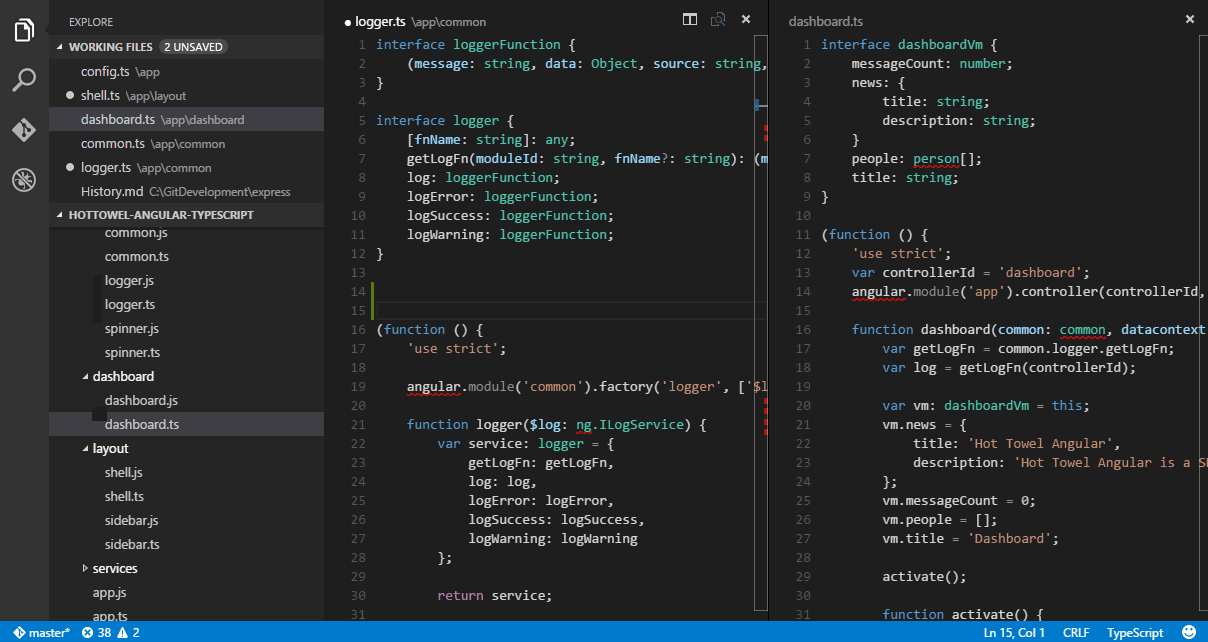
11. KDevelop
KDevelop is just another free, open-source, and cross-platform IDE that works on Linux, Solaris, FreeBSD, Windows, Mac OSX, and other Unix-like operating systems. It is based on the KDevPlatform, KDE, and Qt libraries. KDevelop is highly extensible through plugins and feature-rich with the following notable features:
- Support for Clang-based C/C++ plugin
- KDE 4 config migration support
- A revival of Oketa plugin support
- Support for different line editings in various views and plugins
- Support for Grep view and Uses widget to save vertical space plus many more
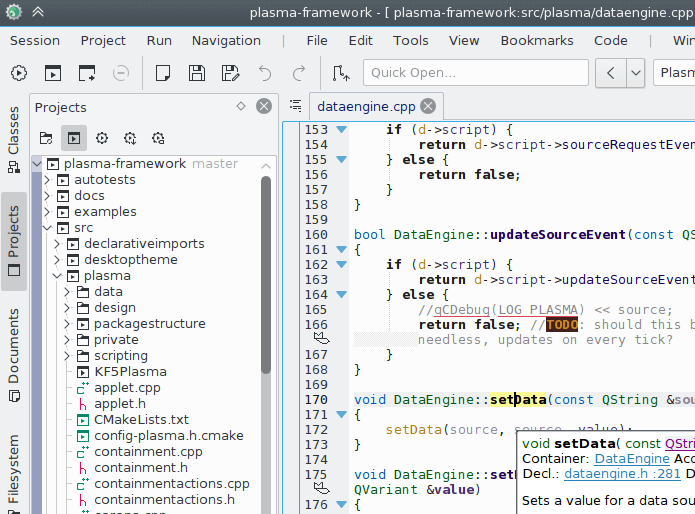
12. Geany IDE
Geany is a free, fast, lightweight, and cross-platform IDE developed to work with few dependencies and also operate independently from popular Linux desktops such as GNOME and KDE. It requires GTK2 libraries for functionality.
Its features list consists of the following:
- Support for syntax highlighting
- Code folding
- Call tips
- Symbol name auto-completion
- Symbol lists
- Code navigation
- A simple project management tool
- In-built system to compile and run a users code
- Extensible through plugins

13. Anjuta DevStudio – Discontinued
Anjuta DevStudio is a simple GNOME yet powerful software development studio that supports several programming languages including C/C++.
It offers advanced programming tools such as project management, GUI designer, interactive debugger, application wizard, source editor, version control plus so many other facilities. In additionally, to the above features, Anjuta DevStudio also has some other great IDE features and these include:
- Simple user interface
- Extensible with plugins
- Integrated Glade for WYSIWYG UI development
- Project wizards and templates
- Integrated GDB debugger
- In-built file manager
- Integrated DevHelp for context-sensitive programming help
- Source code editor with features such as syntax highlighting, smart indentation, auto-indentation, code folding/hiding, text zooming plus many more
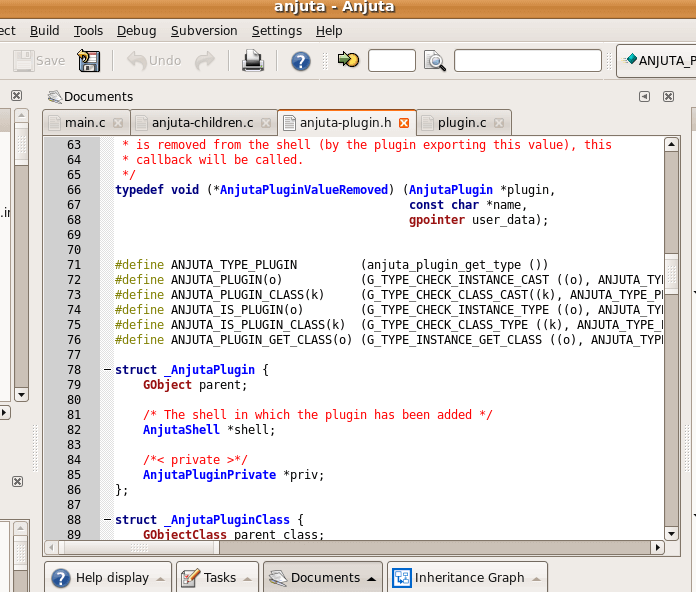
14. The GNAT Programming Studio
The GNAT Programming Studio is a free easy-to-use IDE designed and developed to unify the interaction between a developer and his/her code and software.
Built for ideal programming by facilitating source navigation while highlighting important sections and ideas of a program. It is also designed to offer a high level of programming comfortability, enabling users to develop comprehensive systems from the ground.
It is feature-rich with the following features:
- Intuitive user interface
- Developer friendly
- Multi-lingual and multi-platform
- Flexible MDI(multiple document interface)
- Highly customizable
- Fully extensible with preferred tools

15. Qt Creator
Qt Creator is a free, cross-platform IDE designed for the creation of connected devices, UIs, and applications. Qt creator enables users to do more creation than actual coding of applications.
It can be used to create mobile and desktop applications, and also connected embedded devices.
Some of its features include:
- Sophisticated code editor
- Support for version control
- Project and build management tools
- Multi-screen and multi-platform support for easy switching between build targets plus many more

16. Emacs Editor
Emacs is a free, powerful, highly extensible, and customizable, cross-platform text editor you can use on Linux, Solaris, FreeBSD, NetBSD, OpenBSD, Windows, and Mac OS X.
The core of Emacs is also an interpreter for Emacs Lisp which is a language under the Lisp programming language. As of this writing, the latest release of GNU Emacs is version 27.2 and the fundamental and notable features of Emacs include:
- Content-aware editing modes
- Full Unicode support
- Highly customizable using GUI or Emacs Lisp code
- A packaging system for downloading and installing extensions
- An ecosystem of functionalities beyond normal text editing including a project planner, mail, calendar, and newsreader plus many more
- A complete built-in documentation plus user tutorials and many more
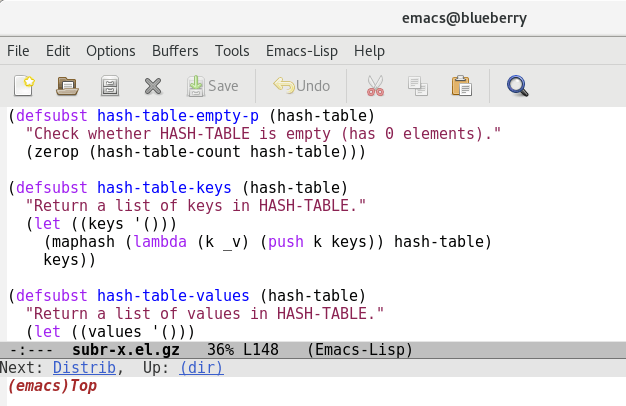
17. SlickEdit
SlickEdit (previously Visual SlickEdit) is an award-winning commercial cross-platform IDE created to enable programmers the ability to code on 7 platforms in 40+ languages. Respected for its feature-rich set of programming tools, SlickEdit allows users to code faster with complete control over their environment.
Its features include:
- Dynamic differencing using DIFFzilla
- Syntax expansion
- Code templates
- Autocomplete
- Custom typing shortcuts with aliases
- Functionality extensions using Slick-C macro language
- Customizable toolbars, mouse operations, menus, and key bindings
- Support for Perl, Python, XML, Ruby, COBOL, Groovy, etc.
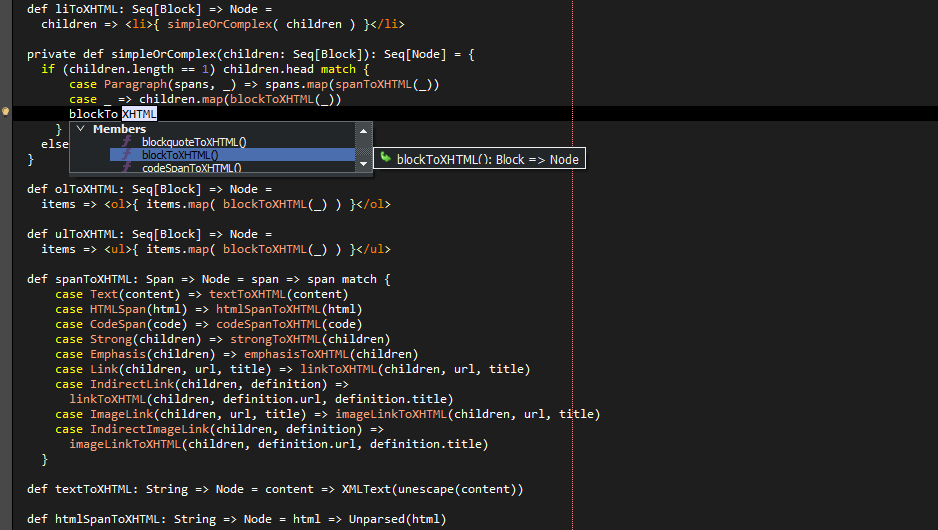
18. Lazarus IDE
Lazarus IDE is a free and open-source Pascal-based cross-platform visual Integrated Development Environment created to provide programmers with a Free Pascal Compiler for rapid application development. It is free for building anything including e.g. software, games, file browsers, graphics editing software, etc. irrespective of whether they will be free or commercial.
Feature highlights include:
- A graphical form designer
- 100% freedom because it is open source
- Drag & Drop support
- Contains 200+ components
- Support for several frameworks
- A built-in Delphi code converter
- A huge welcoming community of professionals, hobbyists, scientists, students, etc.
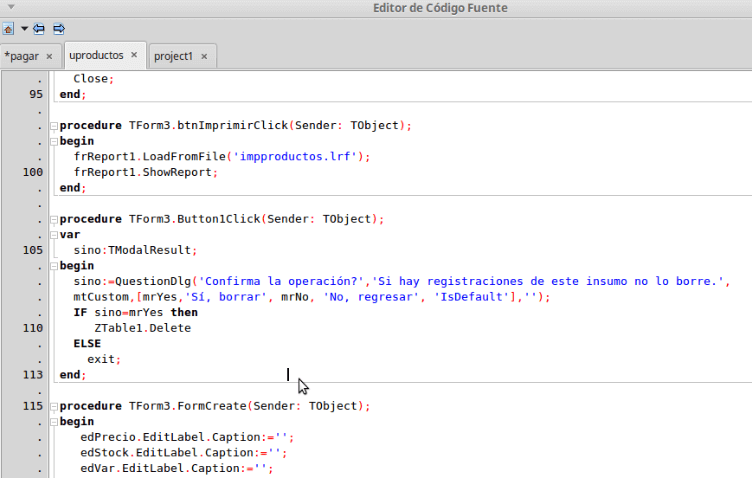
19. MonoDevelop
MonoDevelop is a cross-platform and open-source IDE developed by Xamarin for building web and cross-platform desktop applications with a primary focus on projects that use Mono and .Net frameworks. It has a clean, modern UI with support for extensions and several languages right out of the box.
MonoDevelop’s feature highlights include:
- 100% free and open-source
- A Gtk GUI designer
- Advanced text editing
- A configurable workbench
- Multi-language support e.g. C#, F#, Vala, Visual Basic .NET, etc.
- ASP.NET
- Unit testing, localization, packaging, deployment, etc.
- An integrated debugger
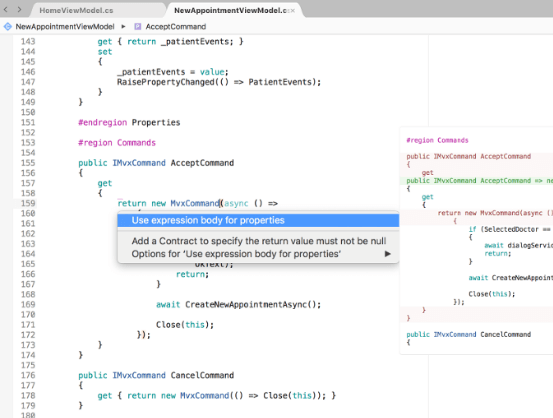
20. Gambas
Gambas is a powerful free and open-source development environment platform based on a Basic interpreter with object extensions similar to those in Visual Basic. To greatly improve its usability and feature set its developers have several additions in the pipeline such as an enhanced web component, a graph component, an object persistence system, and upgrades to its database component.
Among its several current feature highlights are:
- A Just-in-Time compiler
- Declarable local variables from anywhere in a function’s body
- Smooth scrolling animation
- Gambas playground
- JIT compilation in the background
- Support for PowerPC64 and ARM64 architectures
- Built-in Git support
- Auto-closing of braces, markups, strings, and brackets
- A dialog for inserting special characters
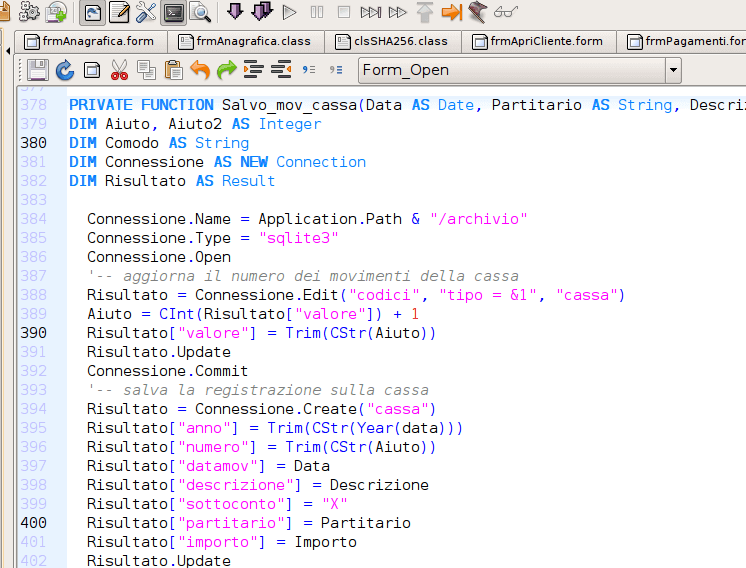
21. The Eric Python IDE
The Eric Python IDE is a full-featured Python IDE written in Python based on the Qt UI toolkit to integrate with Scintilla editor control. It is designed for use by both beginner programmers and professional developers and it contains a plugin system that enables users to easily extend its functionality.
Its feature highlights include:
- 100% free and open-source
- 2 tutorials for beginners – a Log Parser and Mini Browser application
- An integrated web browser
- A source documentation interface
- A wizard for Python regular expressions
- Graphic module diagram import
- A built-in icon editor, screenshot tool, difference checker
- A plugin repository
- Code autocomplete, folding
- Configurable syntax highlighting and window layout
- Brace matching
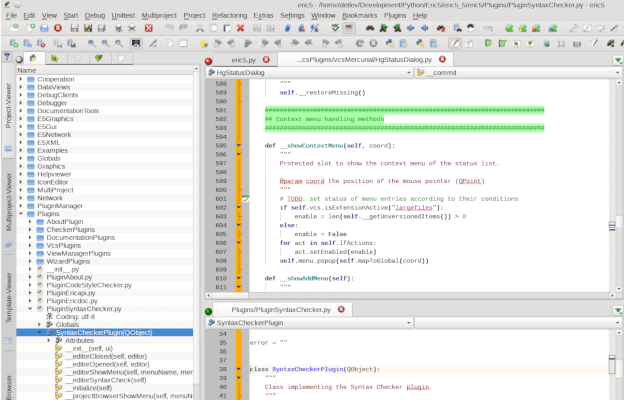
22. Stani’s Python Editor
Stani’s Python Editor is a cross-platform IDE for Python programming. It was developed by Stani Michiels to offer Python developers a free IDE capable of call tips, auto-indentation, PyCrust shell, source index, blender support, etc. It uses a simple UI with tabbed layouts and integration support for several tools.
Stani’s Python Editor’s features include:
- Syntax coloring & highlighting
- A UML viewer
- A PyCrust shell
- File browsers
- Drag and drop support
- Blender support
- PyChecker and Kiki
- wxGlade right out of the box
- Auto indentation & completion
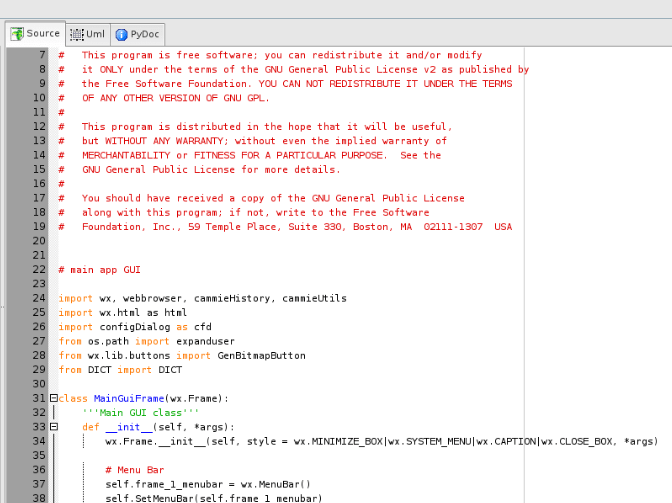
23. Boa Constructor
Boa Constructor is a simple free Python IDE and wxPython GUI builder for Linux, Windows, and Mac Operating Systems. It offers users with Zope support for object creation and editing, visual frame creation and manipulation, property creation and editing from the inspector, etc.
Feature highlights include:
- An object inspector
- A tabbed layout
- A wxPython GUI builder
- Zope support
- An advanced debugger and integrated help
- Inheritance hierarchies
- Code folding
- Python script debugging

24. Graviton
Graviton is a free and open-source minimalist source code editor built with a focus on speed, customizability, and tools that boost productivity for Windows, Linux, and macOS. It features a customizable UI with colorful icons, syntax highlighting, auto-indentation, etc.
Graviton’s features include:
- 100% free and open-source
- A minimalist, clutter-free User Interface
- Customizability using themes
- Plugins
- Autocomplete
- Zen mode
- Full compatibility with CodeMirror themes
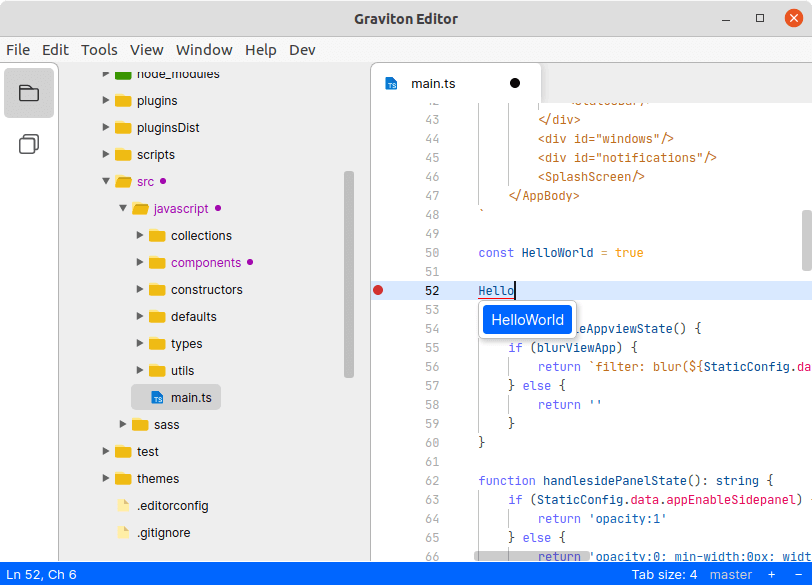
25. MindForger
MindForger is a robust free and open-source performance-driven Markdown IDE developed as a smart note-taker, editor, and organizer with respect for the security and privacy of users. It offers many features for advanced note-taking, management, and sharing such as tag support, data backup, metadata editing, Git and SSH support, etc.
Its features include:
- Free and open source
- Privacy-focused
- Supports several encryption tools e.g. ecryptfs
- Sample mapper
- Automatic linking
- HTML preview and zooming
- Import/export
- Support for tags, metadata editing, and sorting
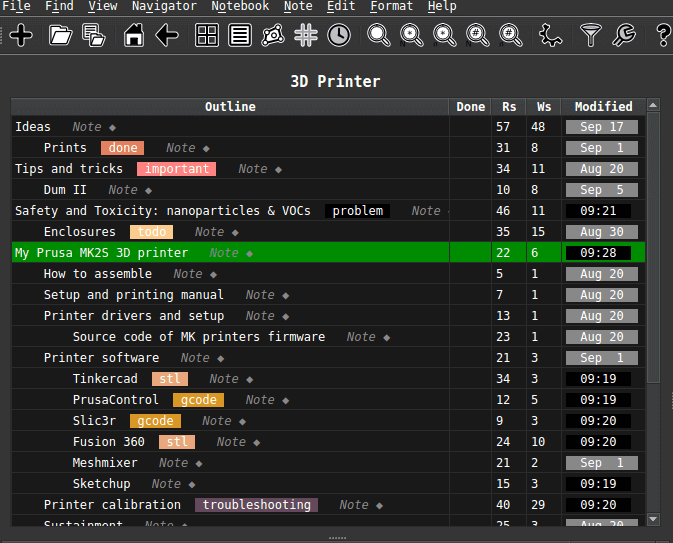
26. Komodo IDE
Komodo IDE is the most popular and powerful multi-language integrated development environment (IDE) for Perl, Python, PHP, Go, Ruby, web development (HTML, CSS, JavaScript), and more.
Check out some of the following key features of Komodo IDE.
- A powerful editor with syntax highlighting, autocomplete, and more.
- A visual debugger to debug, inspect, and test your code.
- Support for Git, Subversion, Mercurial, and more.
- Useful add-ons for customizing and extending features.
- Supports Python, PHP, Perl, Go, Ruby, Node.js, JavaScript, and more.
- Set your own workflow using easy file and project navigation.
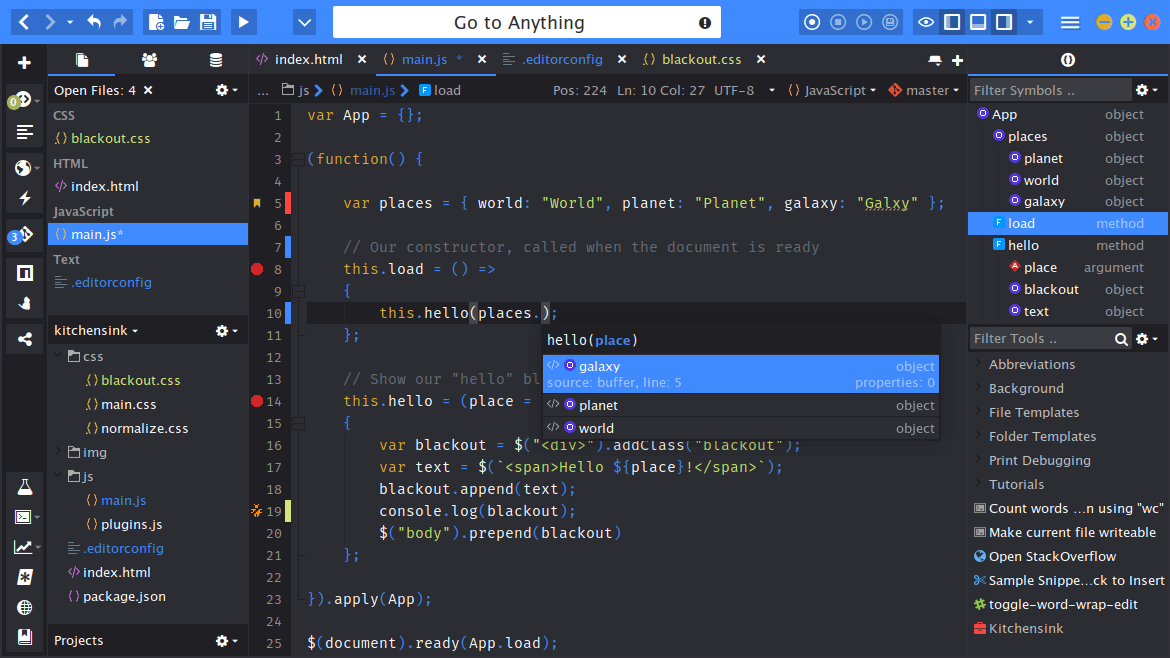
27. VI/VIM Editor
Vim an improved version of the VI editor, is a free, powerful, popular, and highly configurable text editor. It is built to enable efficient text editing and offers exciting editor features for Unix/Linux users, therefore, it is also a good option for writing and editing C/C++ code.
To learn how to use Vim editor in Linux, read our following articles:
Generally, IDEs offer more programming comfort than traditional text editors, therefore it is always a good idea to use them. They come with exciting features and offer a comprehensive development environment, sometimes programmers are caught up in choosing the best IDE to use for C/C++ programming.
There are many other IDEs you can find out and download from the Internet, but trying out several of them can help you find that which suits your needs.

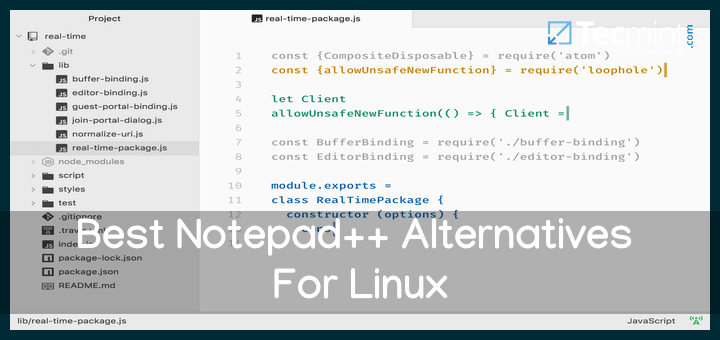
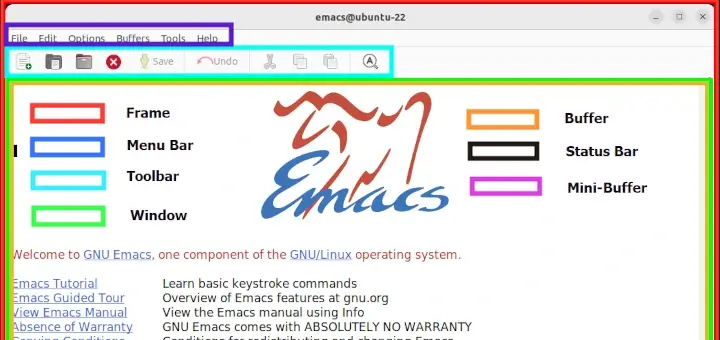
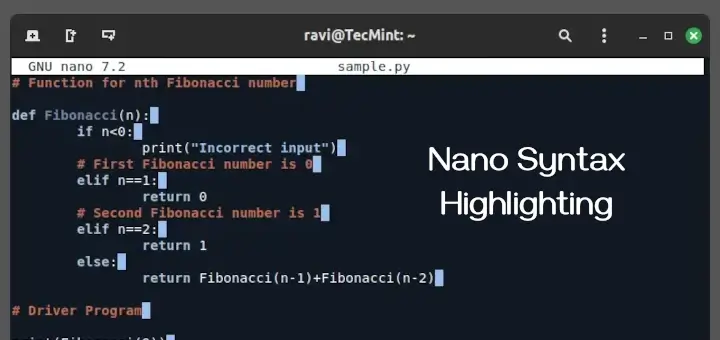
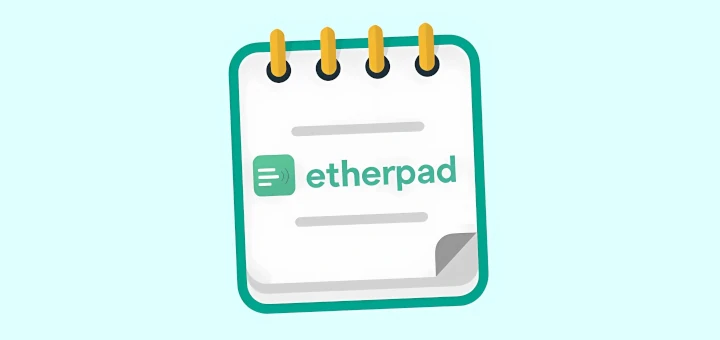
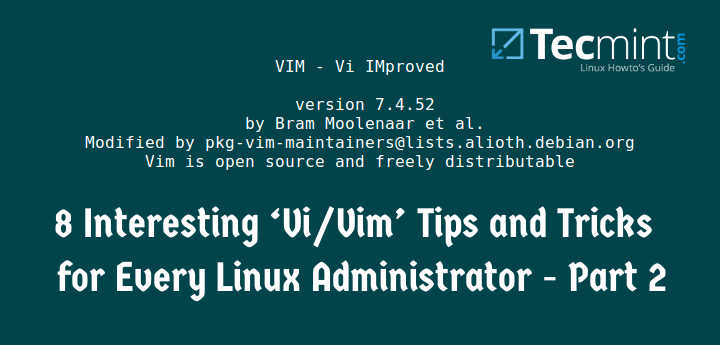
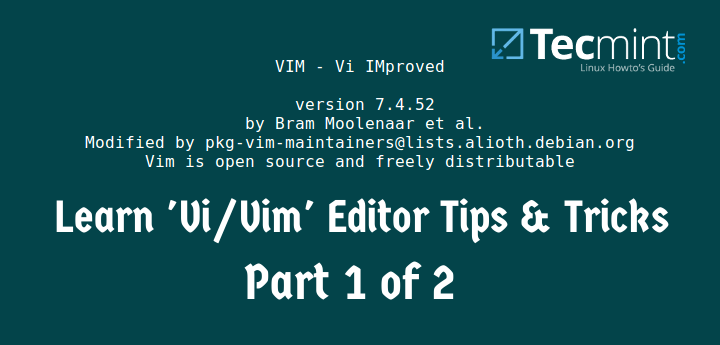
My choice is Codelobster IDE, you should check and must include it in the list…
I know it’s an old thread, but can I use Code::Blocks as a beginner in C++?
I suggest that you go to the Code::Blocks Website: https://wiki.codeblocks.org/index.php/Main_Page
And fully read the FAQ: https://wiki.codeblocks.org/index.php/FAQ
Along with the other information on the Code::Blocks site to answer all your questions.
Graviton link is wrong, here is the new one – https://graviton.netlify.app/
@Boeing,
Thanks, corrected the link in the article…
Why is Qt Creator described as non-free?
https://github.com/qt-creator/qt-creator.@spider-mario
Thanks for raising this concern, there is actually a paid-for version. But we will change the description to free and open source and point the link to the Github repository. Thanks once more.
Where is Komodo?
@tom-erik,
Thanks, added Komodo IDE to the list as suggested..
In all IDEs for C/C++ you show here, I used Netbeans, KDevelop, Code:: Blocks, Eclipse and Visual Studio Code.
The best hands down are Netbeans because is really powerful and more intuitive and consistent. KDevelop is some tied to QT, Code::Block and Visual Studio are some crude, but Eclipse for Linux is simply unusable.
I have been in this business since 1986, and have taught C & C++ on a University level, and well as a contract programmer.
IMHO, having used and experimented with various IDE’s, I have yet to find one I could use comfortably. I currently using a full featured programmers editor, emacs, which could be considered by some, as an IDE. I don’t, even though it should be on the list, to counter the inclusion of vi/vim,
IMHO, the best IDE is the Linux O/S, and bash command line! No, I am not kidding!
I use emacs as my editor, and to compile using a Makefile. (It does have a feature that allows me to locate and correct errors easily! Along with many other excellent features and add-ins.)
For debugging, I don’t use gdb directly, but I do use kdbg, as I find it easier to use than gdb directly.
There are other tools available, such as valgrind, splint, profilers, and others, that may or may not integrate with some IDE’s. Some external tools might integrate well with one or more IDE’s, and other external tools might only work with other IDE’s. All external tools WILL work well with the bash command prompt!
A lot of people, especially beginners, get caught up in figuring out how to configure and use IDE’s, and resort to online forums, when they fail, and can’t figure out how to fix whatever problem the are having! ;^) They spend more time fighting the IDE than writing the program itself!
My favorite misconception by beginners, is: “Code::Blocks is a compiler!” ;^) (See: http://wiki.codeblocks.org/index.php/FAQ-General#Q:_What_Code::Blocks_is_not.3F)
IMHO, when you eliminate the chaff (IDE’s) and concentrate on learning the language, editors, tools, libraries, etc…, you become a better programmer, faster, and more effectively.
Not trying to start a flame war but to offer the bash command line as a valid option to the IDE’s listed.
I’ve tried Code::Blocks and I am very displeased with it. The description here is incorrect. It lacks many IDE features, so what’s all about “offer users the most demanded and ideal features”? The GUI is not consistent at all and contains many bugs.
Furthermore, the syntax highlighting sucks, refactoring is something the devs have never heard of, and closed panels are not automatically opened when new output is generated (compile or console).
Following up on this months-old promise to update the article. As noted, your list is missing sequence #5. No biggie, just a glitch in the production process, I’m sure. To be more clear about the second point, the open-source version of Qt Creator is Free Software, licensed under the GPL v3. I know this is easy to miss, because the Qt web site pushes you to the commercial (closed-source) version. But the open source version is Free, and is available on Github.
@Mark,
Sorry for the delay, we will update this article by this weekend…
Hey. 14 is Anjuta, not Ajunta.
@Edson,
Thanks, corrected in the article.
Should add Jetbrain CLion to the list to, it is pretty good.
@Dung,
Thanks for notifying about Jetbrain CLion, we will add to this list..
It feel like the current list is very limited because of the type of developers creating the list.
I really suggest some pretty good IDE’s that exists for a long time.
like
– segger embedded studio
– intel parallel studio XE
– Crossworks
– Ninja IDE
– Coda
– emIDE.org
– MS visual studio IDE for MAC & Windows
Some of those are paid, and very expensive.
Almost none of those are C++ native IDE
@Maxence
Okay, give us the list of native C++ IDEs and we shall add them to this list. We will be grateful.
No mention of SlickEdit means this is not a professional list. It’s not free, but it’s totally worth it.
@Marc,
Thanks for telling about SlickEdit, we will add it to list..
Lazarus is a good one for Pascal development (with a built in interface designer), Monodevelop is another fairly complete one that probably deserves to be on this list.
Gambas is yet another good one, SPE (Stani’s Python Editor), Eric (another Python Editor) and Boa Constructor (a Python IDE) are other good ones for Python development as well.
This list is incorrect. #5 is missing and Qt Creator is not non-free.
@Incorrect
Okay, thanks for mentioning this, we will correct the article, as soon as possible.
Hello, can some one here suggest me the best IDE in which we can create GUI using python &
DO EMBEDDED CODING
Regarding the first sentence of this article.
C++ is not an extension to C. It is a different language. Although C++ started as an extension to C they are separate things today. For instance, one cannot say C++ is a super set of C.
I have no skill in programming yet, I’m still learning and so far? I have read article after article praising Vim or EMacs, which to me? NEITHER are very nice. The controls are too archaic and you need to actually memorize them in order to get anything done. And while that might be ok if you’re just a hobbyist, when you have deadlines, and meetings to attend it becomes a bit of a setback.
But I am learning that Atom and CodeBlocks are quite nice and usable, along with being user friendly, (which as a Linux user I shouldn’t even utter the words!….LoL!) but they are also not too greedy for resources, and just do what I need it to do…..I guess different strokes for different folks….great articles though!….Keep up the great work!!!
@Eddie
Thanks a lot for sharing your thoughts with us.
Thanks for reminding me of NetBeans! I was looking for a cross-platform and multi-platform IDE for working on embedded projects. This should enable me to sync between build machines (FreeFileSync) and build my projects for all my targets (about 12) on Windows, Mac, and Linux.
@Tom
Am glad that this guide helped you, thanks for the feedback.
gEdit is missing :)
@AlloSchool
Okay, thanks for mentioning, we will add it to the list.
You don’t mean gedit in Ubuntu, do you? That’s just a simple (and I mean SIMPLE) text editor.
Good work, thank you very much Aaron!
Also many thanks to Kris, mentioned Lazarus.
thanks very much
that was very helpful for me
@islam
Welcome, thanks for reading, and for appreciating this piece of work.
You are aware some. Thanks very much
@David
Welcome, thanks for reading and for the feedback.
I am sorry but one IDE is missing. And it is one that is far better than ANY of the ones mentioned. The Lazarus IDE. The only thing is that it is IDE not for C/C++/Java but for Object Pascal. But there currently is no other IDE that is better for creating and debugging GUI apps than Lazarus IDE.
It is exactly the same in every way as its Windows and MacOS flavor. Moreover, it also runs on ARM Linux, including single board computers like raspberry pi. You write your project code once, then you can compile the very exact same project source on any of these platforms in their versions of Lazarus.
And if you are using Linux on your desktop, then with wine you can have both Linux and Windows Lazarus IDE installed and from a single desktop natively compile native Windows and Linux apps without virtualization. None of these listed IDEs can compare, really.
@Kris
Many thanks for mentioning it, and for the clear description, we will check it out.
However I noticed, that in the title you mentioned explicitly that you list IDEs for C/C++, in which case it is ok to ignore Lazarus IDE.
My favorites are Vim, Codeblocks, Codelite and QtCreator, cause they are super lightweight!
I personally like QtCrrator due to its native for Qt Toolkit beside it’s ability to be used for plain c/c++. It support several license schemes, where it’s free if you chose LGPL open source scheme.
@Dedy
Thanks for sharing your thoughts.
Emacs was great when there were no alternatives. Now it’s really kind of an anachronistic toy in my opinion. Sure, it’s really powerful if you 1) want to take the time to learn its own little brand of lisp & 2) want to take the time to create modules for it.
Reminds me of a friend who LOVES the forth programming language. He’s now an IT admin who has no need of any programming language, but boy he loves that forth…
@tim
Many thanks for sharing your experience with us. I personally prefer Vi/Vim over Emacs and here are the reasons: 10 Reasons Why You Should Use Vi/Vim Text Editor in Linux
“visual studio” and “visual studio code” are different editors.
HomePage is hence wrong and should be: “https://code.visualstudio.com/”
@Raphael,
Yes, you correct, we’ve updated the homepage link for visual studio code editor.
I can understand someone doesn’t have the time to try 18 C++ IDE, but then, it’s better to do an in-depth review of *some* of them rather than trying to give an exhaustive list with incorrect information : what you say about e.g. Qt Creator is a lie : IT IS FREE AND OPEN SOURCE !
@Johan
Qt has both free and commercial editions.
Qt is too expensive 3400$/y
@Javier
oops, that’s a lot, but there is a free version as well, you can try it.
Great list!
Also Slickedit 2016 (commercial not free) good editor for c/c++ development
@Serge
Thanks so much for mentioning it out.
Vim works better with proper plugins: http://vim.spf13.com/.
@szszszs
Thanks for the useful suggestion, much appreciated.
The text about Qt Creator is: “It is a non-free, cross-platform IDE”
Not true. It is free and open source!!!
https://www.qt.io/download-open-source/
https://www.qt.io/download-open-source/#section-9
https://code.qt.io/cgit/qt-creator/qt-creator.git/tree/
It is amazing how 11 out of 18 screenshot do not show C or C++ code.
Qt creator is free
@Mohammad
Thanks for letting us know that, i did not actually know it was free.
(grinning) I’m shocked, SHOCKED that emacs did not even get a mention.
@Dan,
Yeah, we’re adding Emacs to the list as per user suggestions, no need to be shocked, it’s just a mistake from our end..
@Dan,
We’ve added Emacs editor to the list as per users request…
Qt Creator is free software (older versions are LGPL, newest is GPL).
You also miss a lot of features it has:-)
I like that it works with cmake, qmake, autotools projects and supports gdb, lldb and cdb (on windows) as well as gcc, clang, icc and msvc compilers and a wide range of version control systems (although I only ever use git;-).
The embedded device support is superb, which other IDE let’s you debug on remote linux machines, android and iOS devices as well as micro controller boards out of the box and without fiddling (provided you use qmake to manage your projects;-).
The refactoring functionality is pretty good, too, and does not need to hide behind any of the other contenders in this list.
From https://www.qt.io/licensing/ “Qt for Application Development is dual-licensed under commercial and open source licenses.” Please see the differences between the licenses at http://www.qt.io/licensing-comparison/
@Rick Stanley
Thanks for pointing that out. That is actually why i mentioned it being non-free, it comes under both commercial and free open-source licenses.
@Karl
Thanks for mentioning many other important features of Qt Creator that are actually missing here, users can always refer to the homepage for more detailed features list and explanations.
SublimeText 3 is the best editor ever.
I have tried a couple of editors, but I will stick to SublimeText.
It takes some time to get familiar with the editor, but after a couple of weeks using it you will never switch.
@Martin Mitterhauser
Yes, Sublime Text is a wonderful editor, thanks for the feedback, it will help a lot of users when making choices of the best editors or IDEs.
QT Creator is free, i.e. it is available under the terms of the GPL3.
And yes, if you mention vi/vim, you should also include emacs.
@Gert,
Yes, I agree with your point, we will include emacs to the list..
You might also want to check out the new lightweight C++11/14/(17) IDE juCi++.
@Ole,
Thanks for suggesting
IDE juCi++tool, we will include in the above article right away…It seems there were more IDE’s for Linux coders….:)First of all, “14 Best IDEs for C++ Programming or Source Code Editors on Linux”, should be “14 Best IDEs for C & C++ Programming or Source Code Editors on Linux”. C is still a valid language and is widely used in Linux O/S, drivers, and applications. There is no reason any of these can be used with C Programming. You do mention C in most of the revues, but the title should also reflect this.
Secondly, if you are going to include vi/vim, then you have to include emacs. No, I am not trying to start a war, just trying to be fair. And yes, I do prefer emacs to vi/vim!
@Rick Stanley
Great point, C is still a mother language, sorry that it was not included in the heading. And Emacs will be included in the list.
You should also update the Intro paragraphs at the top to include C as well. Thank you.
Thanks for your feedback, all the mentioned IDEs and code editors will be added to the list and this review will be updated.
Personally I like JetBrains CLion and for some reason you didn’t even list it. I suggest giving it a try.
@C okay, thanks for your feedback, i will add it to the list
I’m surprised that Microsoft’s Visual Studio Code editor didn’t make the list. Check it out when you get the chance.
@Patrick,
Sure we will check it right way on My Ubuntu box and will update the article with Microsoft’s Visual Studio Code editor..Thanks for sharing with us..
@Patrick, thanks for feedback, Microsoft Visual Code editor will be added as soon as possible.
The Visual Studio Code is excelent Code editor and is open source tool!
@Filippo,
Thanks for sharing, actually we’ve never tried Visual Studio Code so far and we thought it MS product, might be not free so not included in the list, but as you saying its open source, so we will surely give it a try and include in the list as per your suggestion…
@Flippo
You feed back is highly appreciated and we shall add Visual Studio Code editor to the list.
Why the awesome kdevelop is missing from the list?
@Petros,
Sorry for that, actually we don’t know about Kdevelop tool and nor ever we tried, but we give it a try right way and include it in the list soon..till then stay connected to TecMint.com.
@Petros, thanks for your feedback, KDevelop IDE will be added to the list